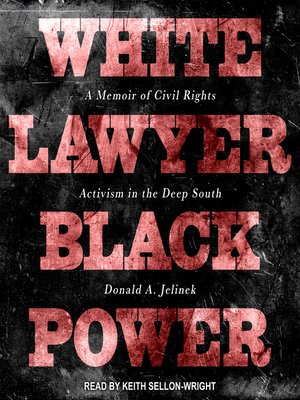White Lawyer Black Power
audiobook (Unabridged) ∣ A Memoir of Civil Rights Activism in the Deep South
By Donald A. Jelinek

Sign up to save your library
With an OverDrive account, you can save your favorite libraries for at-a-glance information about availability. Find out more about OverDrive accounts.
Find this title in Libby, the library reading app by OverDrive.



Search for a digital library with this title
Title found at these libraries:
| Library Name | Distance |
|---|---|
| Loading... |
Inspired by a colleague's involvement in the Mississippi Summer Project of 1964, Wall Street attorney Donald A. Jelinek traveled to the Deep South to volunteer as a civil rights lawyer during his three-week summer vacation in 1965. He stayed for three years.
In White Lawyer, Black Power, Jelinek recounts the battles he fought in defense of militant civil rights activists and rural African Americans, risking his career and his life to further the struggle for racial equality as an organizer for the Student Nonviolent Coordinating Committee and an attorney for the Lawyers Constitutional Defense Committee of the American Civil Liberties Union. Jelinek arrived in the Deep South at a pivotal moment in the movement's history as frustration over the failure of the 1964 Civil Rights Act to improve the daily lives of southern blacks led increasing numbers of activists to question the doctrine of nonviolence.
Replete with sharply etched, complex portraits of the personalities Jelinek encountered, from the rank-and-file civil rights workers who formed the backbone of the movement to the younger, more radical, up-and-coming leaders like Stokely Carmichael and H. "Rap" Brown, White Lawyer, Black Power provides a powerful and sometimes harrowing firsthand account of one of the most significant struggles in American history.
In White Lawyer, Black Power, Jelinek recounts the battles he fought in defense of militant civil rights activists and rural African Americans, risking his career and his life to further the struggle for racial equality as an organizer for the Student Nonviolent Coordinating Committee and an attorney for the Lawyers Constitutional Defense Committee of the American Civil Liberties Union. Jelinek arrived in the Deep South at a pivotal moment in the movement's history as frustration over the failure of the 1964 Civil Rights Act to improve the daily lives of southern blacks led increasing numbers of activists to question the doctrine of nonviolence.
Replete with sharply etched, complex portraits of the personalities Jelinek encountered, from the rank-and-file civil rights workers who formed the backbone of the movement to the younger, more radical, up-and-coming leaders like Stokely Carmichael and H. "Rap" Brown, White Lawyer, Black Power provides a powerful and sometimes harrowing firsthand account of one of the most significant struggles in American history.







